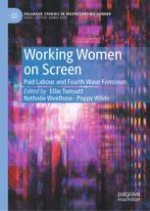2024 | OriginalPaper | Buchkapitel
2. “The Person Inside has Experienced the Most Change…”: The Labour of Fitness, Positivity and Narratives of Suffering
verfasst von : Adrienne Evans
Erschienen in: Working Women on Screen
Aktivieren Sie unsere intelligente Suche, um passende Fachinhalte oder Patente zu finden.
Wählen Sie Textabschnitte aus um mit Künstlicher Intelligenz passenden Patente zu finden. powered by
Markieren Sie Textabschnitte, um KI-gestützt weitere passende Inhalte zu finden. powered by
